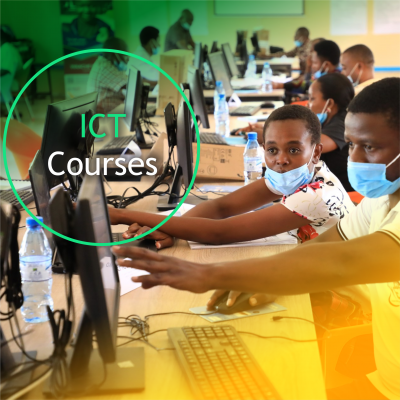Courses
Our Curriculum Overview
A Commitment to Excellence
Mosadikago aims at offering all our students a broad and balanced curriculum that provides rewarding and stimulating activities to prepare them for the best social and cultural life.

QCTO Courses
This programme is ideal for candidates passionate about working in the field of science. The job of a Chemical Laboratory Assistant involves helping scientists and researchers during lab tests and experiments. The duties of a Chemical Laboratory Assistant may include processing samples, classification of results and documenting findings. This qualification offers the necessary foundation for those learners interested in pursuing careers in the field of chemistry. This course is also designed to enhance learners’ computer and mathematical skills

ICT Courses
End User Computing is an essential skill in any business today and is required in order for businesses to meet local and global economic challenges and requirements of a digital world.
Additionally, the End User Computing NQF Level 3 qualification is foundational and generic, which allows for maximum mobility between qualifications. Apart from the workplace needs the qualification will address, it is also designed as an entry-level qualification into most further education and training fields.

Services SETA Courses
The purpose of the Qualification is to develop the appropriate skills and knowledge required by a person for the establishment and development of a small to medium business venture, and address the economic, administrative, and behavioural (psycho-social) barriers that contribute to success in starting and sustaining the venture

Corporate Training
The study encourages scientific reasoning, discoveries and inventions. Great teachers and well-equipped laboratories help students explore, discover and experiment new things under the best supervision.
QCTO Courses
QCTO accreditation: 06-QCTO/SDP040122-4052
101569 Occupational Certificate
101569 Occupational Certificate
This programme is ideal for candidates passionate about working in the field of science. The job of a Chemical Laboratory Assistant involves helping scientists and researchers during lab tests and experiments. The duties of a Chemical Laboratory Assistant may include processing samples, classification of results and documenting findings. This qualification offers the necessary foundation for those learners interested in pursuing careers in the field of chemistry. This course is also designed to enhance learners’ computer and mathematical skills
- Grade 11
- 2 years confirmed work experience
Certification and Examination Authority
Upon successful completion of this programme, learners will receive a Certificate: Career Development Information Officer issued by the Quality Council for Trades & Occupations (QCTO).
One (1) year full-time or two (2) years part-time
101408 Occupational Certificate
Computer Technician NQF 5
Upon completion of the qualification students will be expected to provides technical assistance to users, including diagnosing and resolving issues and problems with software, hardware, computer peripheral equipment, networks, databases, systems and the internet.
The qualification outcomes cover types of software, hardware, components, upgrading and troubleshooting a computer, formatting and partitioning hard drives, and network topologies. Green technology, maintaining records of daily problems and remedial actions, and prepare evaluations for systems performance.
12 months
- Computer Database Assistant
- Software Developer
- Computer/Network Support Technician
- System Administrator
- Project Manager and other related occupations.
ICT COURSES
MICT SETA Accreditation: ACC/2013/06/3022
END USER COMPUTING
National Certificate: Information Technology:
End User Computing (131 credits)
End User Computing is an essential skill in any business today and is required in order for businesses to meet local and global economic challenges and requirements of a digital world.
Additionally, the End User Computing NQF Level 3 qualification is foundational and generic, which allows for maximum mobility between qualifications. Apart from the workplace needs the qualification will address, it is also designed as an entry-level qualification into most further education and training fields.
12 months
- Operate a Personal Computer
- English Communication Fundamentals
- Business Calculations 101
- MS Word
- MS Excel
- MS Access
- MS PowerPoint
Internet and E-mail
IT Concepts
TECHNICAL SUPPORT
78964: Further Education and Training Certificate: Information Technology:
Technical Support ( 163 credits)
The Information Technology (IT) Technical Support is based on a cutting-edge new Learnership model that uses Blended Learning: an approach that innovatively takes advantage of both digital learning and the tried-and-tested benefits of instructor-led learning. Digital learning offers exceptional convenience, pace, choice and flexibility, while instructor-led learning, in a face-to-face learning environment guided by expert facilitators, brings structure to the learning experience.
This Learnership will equip qualifying learners with well-rounded entry-level professional Technical Support skills and good fundamental knowledge of the Information Technology field, coupled with interpersonal and business skills
12 months
Learner Induction and Orientation for eLearning
Module 1: Communicate Effectively in a Technical Support Environment (48 credits)
Module 2: Mathematical Literacy (16 credits)
Module 3: Computer Technology Principles & Support (66 credits)
Module 4: Data Communication and Networking Support (56 credits)
SYSTEM DEVELOPMENT
78965 Further Education and Training Certificate:
Technical Support ( 163 credits)
Systems developers are required to create, maintain, audit and improve the IT systems within an organisation. A system developers function can extend to include database management, web programming, multimedia and writing code and more.
The work of an IT systems developer is one that requires a strong technical component and a desire to keep learning. The world of information technology is constantly changing as the world moves rapidly into the digital age.
12 months
Module 1. Introduction to computer systems and technology
Module 2. Computer architecture, networking and data storage systems
Module 3. Introduction to computer programming
Module 4. Principles of internet-based software development
Module 5. Information systems analysis
Module 6. Resolving customer complaints
Module 7. Testing IT systems
Module 8. Business communication
Module 9. Mathematics
SHORT ICT COURSES
ICT 3 Months Course
18 credits
The course is an introduction to computer and the Microsoft Software, one of the dominating and popular computer software in current technology both in business and in the workplace.
The course will help you understand the primary Office components such as Excel (for data spreadsheets,), Word (for writing/word processing) and PowerPoint (Presentations). The course was designed to help you become highly comfortable with using all this popular software to help you succeed in your career or business.
3 months
Ms Word
Ms Excel
Ms Power Point
ICT 6 Months Course
43 credits
The world has gone digital. Understanding the basic concepts of the internet and how to use it in the business environment is a very essential skill that anyone should have. In a world driven by digital technologies such as Computers and Mobile phones sending messages electronically has become a virtual norm. In this course your will understand the concepts of writing, replying and forwarding emails as well as how attachments and links work.
You will also understand how to get on to the internet and how to use it. You will learn about the internet browsers such as Microsoft Internet Explorer, Mozilla Firefox and Google Chrome. Some of the basic concepts include understanding URLs, links and search engines.
6 months
Operate a Personal Computer
MS Word
MS Excel
MS Access
MS PowerPoint
Internet and E-mail
ICT Office Administration
79 credits
The world has gone digital. Understanding the basic concepts of the internet and how to use it in the business environment is a very essential skill that anyone should have. In a world driven by digital technologies such as Computers and Mobile phones sending messages electronically has become a virtual norm. In this course your will understand the concepts of writing, replying and forwarding emails as well as how attachments and links work.
You will also understand how to get on to the internet and how to use it. You will learn about the internet browsers such as Microsoft Internet Explorer, Mozilla Firefox and Google Chrome. Some of the basic concepts include understanding URLs, links and search engines.
8 months
- Operate a Personal Computer
- MS Word
- MS Excel
- MS Access
- MS PowerPoint
- Internet and E-mail
- IT Concepts
- Business Documents
- Interview Preparation and CV Layout
SERVICES SETA COURSES
Services seta accreditation No: 12799
New venture Creation NQF 2 and 4
(138 and 149 respectively)
The purpose of the Qualification is to develop the appropriate skills and knowledge required by a person for the establishment and development of a small to medium business venture, and address the economic, administrative, and behavioural (psycho-social) barriers that contribute to success in starting and sustaining the venture.
This qualification is intended for persons who wish to start, operate, manage, and grow a new small to medium business venture. Learners attempting this qualification will be equipped with a variety of technical, business managerial and personal skills and strategies to help them succeed in the creation and sustenance of a business. The successful learner will develop a sound foundation for the application of these skills and knowledge to explore a diverse range of entrepreneurial opportunities.
12 Months
Generic Management NQF 4
Further Education and Training Certificate: Generic Management (150 credits)
The Further Education and Training Certificate in Generic Management NQF Level 4 is an accredited full qualification quality assured by Services SETA. It has been specifically developed to build a wide range of management competencies.
Key competencies developed include planning, leading, staff motivation, organising, budgeting, ethics, and essential skills like decision making, motivation, and negotiation.
This qualification specifically develops management competencies required by learners in any occupation, particularly those who are currently operating as junior managers or team leaders. The qualification introduces key terms, rules, concepts, principles, and practices of management that will enable learners to be informed managers in any occupation. It has also been developed to enable managers or prospective managers to access higher education and provide flexible access to life-long learning.
The qualification is widely recognised as a starting point for managers who are climbing the corporate ladder and it provides successful learners with access to the National Certificate in Generic Management NQF Level 5.
12 Months
CORPORATE TRAINING
Corporate training is important because it provides a path for companies to meet their goals by empowering employees with skills andknowledge. Corporate training programs are essential to employee success and therefore also essential to overall company success.
Our corporate training programme turnemployees’ capabilities into productive and profitable objectives into substantial outcomes
Chemistry Corporate Service
- Develop standard operating procedures (SOP)
- Develop work instructions (WI)
- Instrument calibration (XRF, ICP)
- Method Validation
- Instrument validation
- Study to Improve turnaround time
Some of our Corporate Courses
Business Report Writing
The programme has been developed to assist delegates to grasp the essential components of various types of reports and their formats. Delegates are shown how to plan, write and edit reports for use as executive decision-making tools, including validation in order to present credible reports for management evaluation.
Paperwork – the unofficial “grease in the axles” of the business world. Even as we move further and further into the paperless future, digital paperwork remains as a bastion of processing business processes. Writing is, therefore, a critical skill. The difference that effective writing skills make to every layer of the organisation, cannot be understated. When communications are clear, concise and accurate, with the appropriate amount of detail and nuance, the whole business benefits. Misunderstandings don’t happen, things don’t get overlooked, and operational inefficiencies are discovered and addressed.
The Business and Report Writing Skills course is all about writing effectively and professionally in the business environment. Delegates learn how to craft clear, unambiguous communication in plain language that improves the quality of written documentation, and how to recognise the conventions and features specific to business texts in order to use them as needed.
The course pays specific attention to report writing, which is included to help delegates relate the features of a range of reports to the information needs of a business. The Report Writing modules teach delegates how to identify information sources, compile function-specific business reports, and follow reporting deadlines. Delegates also learn how to plan research and allocate resources to maximise efficiencies and minimise costs while achieving their information objectives.
Module 1: Identify and collect information needed to write a function-specific text
Module 2: Use textual features and business text conventions for effective writing
Module 3: Organise and structure text appropriately for a business function
Module 4: Compose a function-specific text using plain language
Module 5: Relate the purpose, content, form, frequency and recipients of range of reports
Module 6: Identify information sources and procedures for obtaining information
Module 7: Compile a report for a specific business function
Module 8: Liaise with relevant parties and verify that reported information is in accordance with requirements
Module 9: Plan a report to meet audience and information requirements
Excel
The programme has been developed to assist delegates to grasp the essential components of MS Excel from beginners level to advanced. Delegates will be able to understand the concept of spread sheets and will be able to demonstrate the ability to use a spread sheet application on a computer
Employees can benefit from Excel training in many ways, from increasing value to learning better tools to improve their work output. The advanced training will not only provide employers with higher-skilled employees but will also provide employees with tools that can help them work more effectively in their current positions and equip them to advance to higher-level positions, it can also provide numerous benefits for the company.
We believe that there is no better way to empower your workforce, improve their skills, and make them more valuable to the company than allowing them to use vital programs to maximum effectiveness.
- Getting started
- Spreadsheetterminology– Discussing spreadsheet terminology
- ExploringtheExcelwindow– Examining Excel window components
- GettingHelp– Using Help
- Navigatingworkbooks– Navigating a worksheet
- Entering and editing data
- Enteringandeditingtextandvalues - Entering text and values
- Enteringandeditingformulas
- Workingwithpictures– Inserting and modifying a picture
- Savingandupdatingworkbooks
- Modifying a worksheet
- Moving and copying data
- Moving and copying formulas
- Absolute and relative references
- Inserting and deleting ranges, rows, and columns
- Using functions
- Entering functions
- AutoSum – Using the AutoSum button
- Other useful functions
- Formatting worksheets
- Formatting text
- Formatting rows and columns
- Formatting numbers
- Conditional formatting
- Copying formats and applying table formats
- Printing
- Preparing to print
- Page Setup options
- Printing worksheets
- Creating charts
- Chart basics
- Modifying charts
- Printing charts Managing large workbooks
- Viewing large worksheets
- Printing large worksheets - Setting print titles
- Using multiple worksheets
- Change the appearance of spreadsheet
- Modify the display of spreadsheet data.
- Apply conditional formatting to data.
Work with comments, Create and use templates
